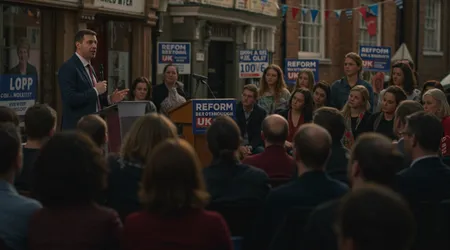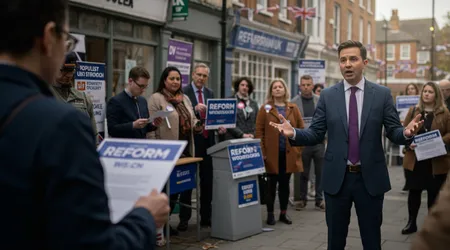Populist Reform UK Poised for Breakthrough in Local Elections, Challenging Conservative Dominance

Populist Reform UK stands at a pivotal moment as Thursday’s local elections loom, threatening to reshape Britain’s political landscape.
Under Nigel Farage’s leadership, the party’s blend of anti-establishment rhetoric and right-wing populism has gained traction, capitalizing on voter disillusionment with both Labour’s early governance missteps and the Conservatives’ post-election slump.
With polls predicting significant gains potentially 400 to 450 council seats Populist Reform UK could eclipse the Conservatives, long the dominant right-wing force, and position itself as Labour’s primary challenger.
This surge reflects a broader fragmentation in UK politics, where traditional allegiances are fraying, and voters are gravitating toward bold, outsider voices.
Could this be the moment when Populist Reform UK cements itself as a permanent fixture, or is it merely a fleeting protest vote?
Below, we explore the dynamics driving this potential realignment, from voter sentiment to strategic maneuvering, and what it means for Britain’s future.
The elections, spanning 23 councils and several mayoral races, are a critical test for all parties.
For Populist Reform UK, they represent an opportunity to translate polling strength currently tied with Labour at 25% into tangible power.
The Conservatives, defending nearly 1,000 seats, face a brutal reckoning after their 2024 general election drubbing.
Labour, meanwhile, grapples with a plummeting approval rating, down from its 2024 landslide.
This volatile backdrop sets the stage for Populist Reform UK to exploit widespread frustration, particularly in traditional Conservative and Labour heartlands.
By examining the party’s rise, its challenges, and the broader implications, this article unpacks a defining moment in British politics.
The Rise of Populist Reform UK: A Perfect Storm
Disillusionment with the political establishment has fueled Populist Reform UK’s meteoric rise. Voters, battered by economic stagnation and cultural divides, crave alternatives.
Farage’s party, once a scrappy operation, has professionalized rapidly since securing five parliamentary seats in 2024.
Populist Reform UK now contests 99% of local election seats, a feat surpassing even Labour and the Conservatives.
This expansion reflects strategic recruitment, including 80 former Conservative candidates and staff, poached after the Tories’ 2024 collapse.
The party’s messaging anti-immigration, anti-woke, and pro-Brexit resonates in areas like Doncaster, where Labour’s grip is weakening.
Farage’s charisma is a key asset, akin to a conductor orchestrating a symphony of discontent. His tractor-bound campaign stunts, like one in Frodsham, electrify supporters.
Populist Reform UK thrives in Labour’s “red wall” and Tory shires, where voters feel ignored.
A YouGov poll (April 9-23, 2025) shows Reform leading in Cambridgeshire’s mayoral race, with 20% to Labour’s 19%. This shift isn’t just numerical; it’s a cultural revolt against elites.
++ UK Counter-Terror Police Probe Kneecap Band Over Hamas and Tory Remarks
Yet, the party’s thin policy platform raises questions about its readiness to govern.
The surge also stems from Labour’s stumbles. Sir Keir Starmer’s government, barely a year old, faces backlash over slow progress and missteps like the Cambridgeshire congestion charge.
Populist Reform UK exploits this, promising local control and lower taxes. In Hull, candidate Luke Campbell’s pledge to scrap council waste resonates with cash-strapped residents.
But can rhetoric translate into results? The party’s lack of governing experience looms large, especially in complex council budgets.

Conservative Decline: A Self-Inflicted Wound
The Conservatives’ freefall has opened the door for Populist Reform UK. Once untouchable under Boris Johnson, the Tories now languish at 21% in polls.
Their 2024 election loss described by pollster John Curtice as “murdered” by Reform exposed deep fractures.
Kemi Badenoch’s leadership struggles to unify a party bleeding voters to Populist Reform UK. In Staffordshire, a Tory stronghold since 2009, Reform’s rise threatens to flip seats.
The party’s failure to address voter concerns on immigration and taxes has ceded ground to Farage’s simpler narrative.
Also read: London Aims to Host 2040 Olympics: A Bold Vision for History
Internal Tory chaos compounds the problem. Shadow Justice Secretary Robert Jenrick’s call for a “united right” hints at coalition talks, but Badenoch rejects national deals.
Local coalitions, however, remain possible, as seen in potential power-sharing in Lincolnshire.
The Conservatives’ 996 seats at stake dwarf Labour’s 280, making losses inevitable. A predicted 500-seat drop would cripple their local influence, handing Populist Reform UK a symbolic victory.
Yet, the Tories aren’t powerless. In Cambridgeshire, candidate Paul Bristow leads with 32%, bolstered by pledges like free parking.
Such hyper-local promises could stem the tide.
Still, the party’s broader failure to counter Populist Reform UK’s populist appeal vividly illustrated by Farage’s mug-wielding Frodsham rally suggests a deeper identity crisis.
Without a compelling vision, the Conservatives risk becoming a footnote.
Labour’s Vulnerability: A Fractured Base
Labour’s early governance woes have made it a prime target for Populist Reform UK. Polls show Labour tied with Reform at 25%, a sharp decline from 2024’s landslide.
In Runcorn’s by-election, Reform’s Sarah Pochin narrowly leads, signaling cracks in Labour’s northwest stronghold.
Starmer’s inability to deliver rapid change coupled with controversies like the arrested Cambridgeshire mayor has alienated voters.
Populist Reform UK capitalizes, framing Labour as out-of-touch elites.
The party’s urban base, especially younger women, is drifting to the Greens, as noted by Gaby Hinsliff in The Guardian.
Meanwhile, working-class voters in Doncaster and Durham lean toward Reform’s anti-immigration stance. Labour’s 280 seats are vulnerable, with pollster Lord Hayward predicting losses in key councils.
Starmer’s focus on long-term reforms, like the Independent Football Regulator, fails to counter Populist Reform UK’s immediate, emotive appeals.
Consider Jane, a Doncaster nurse voting Reform after Labour’s tax hikes hit her budget. Her story mirrors thousands, showing Labour’s disconnect.
Starmer’s team downplays expectations, but a weak showing could destabilize his leadership.
Populist Reform UK’s ability to peel off Labour voters, as seen in one in twelve switching per Curtice, underscores the party’s cross-party appeal.
The Broader Realignment: A Fragmented Future
The local elections signal a seismic shift in UK politics, with Populist Reform UK at the vanguard.
Polls like More in Common’s MRP (March 14-April 1, 2025) project Reform winning 180 seats in a hypothetical general election, outpacing Labour and Tories at 165 each.
This fragmentation echoing the Liberal Democrats’ 67 projected seats suggests a multiparty future. Populist Reform UK’s rise mirrors global populist waves, from Trump to Le Pen, but its local focus sets it apart.
Reform’s success hinges on turning votes into seats, a challenge given its historically thin spread. In 2024, it outpolled the Lib Dems but won fewer seats.
Strategic targeting, like Andrea Jenkyns’ 40% lead in Lincolnshire’s mayoral race, shows progress. Yet, governing councils demands competence, not just rhetoric.
A Reform-led Doncaster cutting services could backfire, as Sean O’Grady warns in The Independent.
The Liberal Democrats and Greens also gain, with the latter eyeing Bristol’s mayoralty.
This left-wing fragmentation balances Reform’s right-wing surge, creating a crowded field. Britain’s two-party dominance, a century-old fixture, may be crumbling, as Curtice notes.
Populist Reform UK’s role as kingmaker or spoiler will shape the next general election.
Challenges Ahead for Reform: From Protest to Power

Transitioning from protest to power poses Populist Reform UK’s greatest test. Winning seats is one thing; governing is another.
Councils face tight budgets, and Reform’s vague promises like slashing “wasteful” programs risk chaos. In Hull, candidate Luke Campbell’s pledge to cut council taxes ignores rising service costs.
Populist Reform UK’s inexperience could mirror a novice chef botching a complex recipe.
Farage’s party also faces scrutiny over its populist label. Critics, like the Lib Dems, accuse it of targeting vulnerable groups, such as special needs funding.
Reform’s anti-immigration stance, while popular in Runcorn, alienates urban moderates. Balancing its base with broader appeal is crucial.
Populist Reform UK’s five MPs, including Farage, must professionalize further to avoid being labeled “fruitcakes,” as David Cameron once quipped.
Public perception is another hurdle. A Reform-led council failing to deliver like a Lincolnshire mayor botching transport could dent its momentum.
Yet, success in high-profile races, like Jenkyns’ predicted Lincolnshire win, could solidify Populist Reform UK as a credible force, paving the way for 2029 ambitions.
Table: Local Election Polling Snapshot (April 2025)
| Party | National Vote Share | Predicted Council Seat Gains/Losses |
|---|---|---|
| Reform UK | 25% | +400 to 450 |
| Labour | 25% | -25 to +25 |
| Conservatives | 21% | -500 |
| Lib Dems | 14% | +50 to 100 |
| Greens | 9% | +20 to 30 |
What This Means for Britain’s Political Future
The elections could redefine Britain’s political fault lines. If Populist Reform UK secures 400 seats, as Lord Hayward predicts, it will eclipse the Conservatives as the right’s standard-bearer.
This shift, coupled with Labour’s struggles, suggests a volatile multiparty system.
Populist Reform UK’s ability to sustain momentum depends on delivering locally, from Lincolnshire’s roads to Doncaster’s hospitals.
The Conservatives face an existential crisis. A 500-seat loss would force soul-searching, with coalition talks likely despite Badenoch’s denials.
Labour, too, must reconnect with voters like Jane, or risk further erosion. The broader rise of smaller parties Lib Dems, Greens, SNP points to a fragmented electorate, hungry for authenticity over polish.
Imagine British politics as a chessboard: Populist Reform UK is a knight, unpredictable and disruptive.
Its next moves will determine whether it checkmates the establishment or overplays its hand.
For voters, these elections are a chance to redefine priorities local services, taxes, identity. The outcome will echo far beyond May 1, 2025.
Conclusion: A Turning Point for Britain
Thursday’s elections are more than a local contest; they’re a referendum on Britain’s political soul.
Populist Reform UK, with its bold promises and outsider appeal, stands poised to upend decades of Conservative dominance.
Polls, like YouGov’s Cambridgeshire data, and stories, like Jane’s in Doncaster, reveal a nation restless for change.
Yet, Reform’s untested governance and thin policies raise doubts about its longevity.
Labour’s fragility and the Tories’ collapse create a perfect storm, but the rise of Greens and Lib Dems ensures no single party holds all the cards.
This moment recalls 1997, when Labour’s landslide reshaped politics. Today, Populist Reform UK could spark a similar realignment, but only if it balances rhetoric with results.
Voters, from Runcorn to Lincolnshire, will decide whether Farage’s vision endures or fizzles.
As Britain stands at this crossroads, one question lingers: will we embrace the chaos of change or cling to the familiar? The answer lies in the ballot box.
Frequently Asked Questions
1. What is driving Populist Reform UK’s surge in the 2025 local elections?
Voter frustration with Labour’s slow progress and Conservative failures, combined with Farage’s anti-establishment appeal, fuels Populist Reform UK’s rise.
2. Can Populist Reform UK govern effectively if it wins council seats?
While Populist Reform UK excels at campaigning, its vague policies and lack of experience could hinder effective governance, risking voter backlash.
3. How will these elections impact the Conservative Party?
A predicted 500-seat loss could force the Conservatives into coalitions or a leadership crisis, weakening their right-wing dominance.
4. Are Labour’s losses inevitable?
Labour’s 25% polling tie with Reform suggests vulnerability, but strategic local campaigns could limit losses in key areas like Runcorn.
